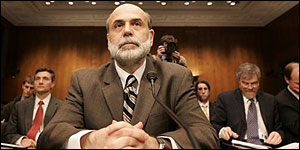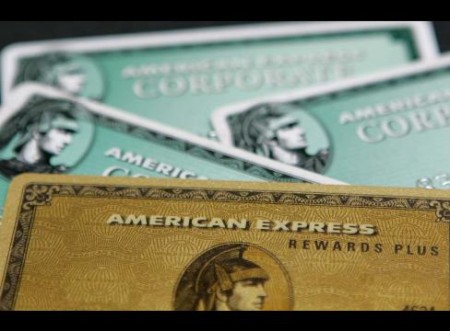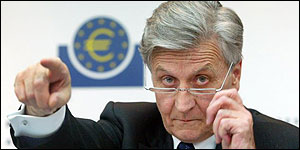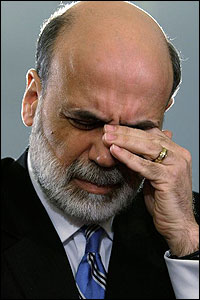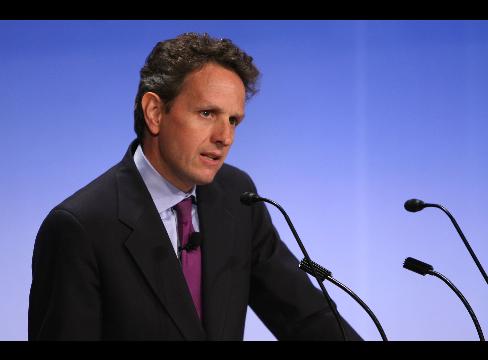June 27 (Bloomberg) — European confidence dropped more than economists forecast this month and retail sales plunged, signaling that economic growth is continuing to cool even as the European Central Bank prepares to lift interest rates to a seven-year high to tackle inflation.
An index measuring sentiment in the euro area fell to 94.9, the lowest since May 2005, from 97.6 the previous month, the European Commission in Brussels said today. Separate reports showed European retail sales plummeted, while inflation accelerated in Germany and Spain.
Stocks fell in Europe today as oil climbed to a record above $140 a barrel and Carrefour SA, Europe’s biggest retailer, scaled back its earnings forecast. With soaring food and energy prices boosting inflation, ECB President Jean-Claude Trichet has said the bank may raise the benchmark rate next week by a quarter point to 4.25 percent.
``The economy has hit the wall,” said Ken Wattret, senior economist at BNP Paribas SA in London. ECB officials “run the risk of tipping the euro area into a recession” as the inflation outlook increases the risk that the central bank “may need to go beyond one rate rise.”
Confidence among the manufacturing, construction and retail industries across the 15 nations that share the euro declined this month, as did consumer sentiment, according to today’s commission report.
The Bloomberg retail index, based on a survey of more than 1,000 executives compiled by Markit Economics, fell to 44 this month from 53.1 in May. A reading below 50 indicates contraction. Europe’s manufacturing and services industries also contracted this month.
Export Growth
The euro has increased 17 percent against the dollar in the last 12 months, threatening export growth, and was at $1.5770 today. The Dow Jones Stoxx 600 index fell 1.3 percent to 284.67 as of 11:29 a.m. in Brussels.
Separate figures today showed France’s economy expanded less than initially estimated in the first quarter as household spending, the driving force of growth, stagnated. U.K. first- quarter growth was revised lower today.
ECB council member Miguel Angel Fernandez Ordonez said today a July rate increase is not a certainty.
“Nothing is inevitable in life,” Ordonez told reporters in Rome today. “What we said was that the increase is not certain, but possible.”
Still, the ECB remains focused on consumer-price growth, according to ECB Executive Board member Juergen Stark. He said yesterday the bank sees its primary aim as being to “firmly anchor inflation expectations.”
16-Year High
Euro-area inflation reached a 16-year high of 3.7 percent in May. In Spain, inflation accelerated to 5.1 percent this month, the fastest on record, according to data today. Inflation in four German states also accelerated this month.
Oil prices have doubled in a year and Libyan National Oil Corp. Chairman Shokri Ghanem said yesterday that $150 a barrel may be “around the corner.”
Companies expect to raise prices more than previously anticipated to recover soaring costs, the commission report showed. A gauge of companies’ selling-price expectations rose to 18 in June from 16 in May, which compares with an average reading of 6 over the last 18 years. Consumers also expect prices to rise more sharply than they did last month.
The “worrying combination” of falling confidence and rising price expectations, “will add to fears of stagflation in the euro zone,” said Martin van Vliet, an economist at ING Group in Amsterdam.
`Remain Elevated’
“Inflation is likely to remain elevated for a longer period than we initially expected,” EU Monetary Affairs Commissioner Joaquin Almunia said in London today. It “should only begin to show a significant deceleration around the end of this year, although further possible rises in the price of oil and agricultural products cannot be ruled out.”
Read moreThe Economy Has Hit The Wall: Oil above $ 140, Consumer Confidence Falls, Retail Sales Slump

